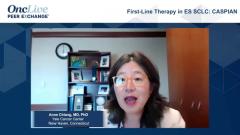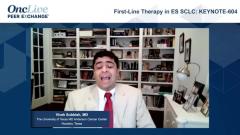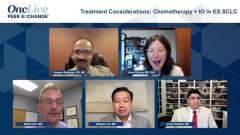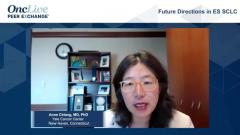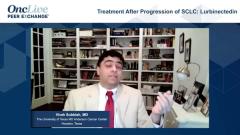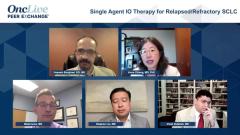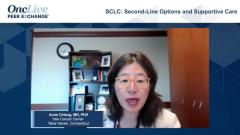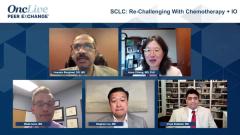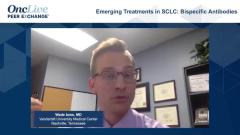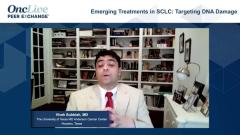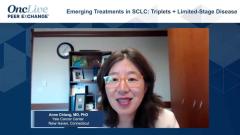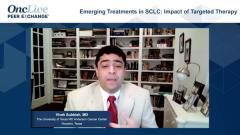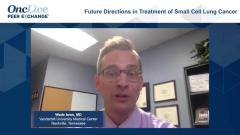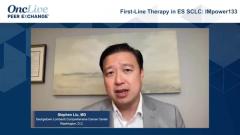
SCLC: Second-Line Options and Supportive Care
Key opinion leaders in thoracic oncology provide insights into second-line treatment for patients with relapsed/refractory small cell lung cancer and comment on the role of trilaciclib in managing cisplatin-associated neutropenia.
Episodes in this series

Hossein Borghaei, DO, MS: Wade, what percentage of your patients with small cell lung cancer make it to the second line or receive any second-line therapy at your institution? Do you have any sense of that?
Wade Iams, MD: I would estimate a narrow majority. Many patients have quite aggressive disease and ultimately don’t make it to second-line therapy for a variety of reasons and complications. Then there’s a cohort of choice who want to hear their prognosis delivered directly and understand that the treatment options aren’t very good. As we’re discussing, there’s a lot of toxicity associated with those options.
Hossein Borghaei, DO, MS: Vivek, if somebody has evidence of disease progression greater than 180 days post-treatment, what’s your treatment approach for those patients at that point?
Vivek Subbiah, MD: Interestingly, they showed in around 20 patients that lurbinectedin has a reasonable response rate in patients with the same chemotherapy-free interval of greater than 180 days. We don’t have a head-to-head study with lurbinectedin and topotecan, but if I don’t want to rechallenge platinum, lurbinectedin might be a reasonable option in this setting, especially in patients who don’t respond to I/O [immuno-oncology].
Hossein Borghaei, DO, MS: Does anybody on this panel go back to platinum etoposide for a re-challenge? Stephen, you raised your hand. Can you comment?
Stephen Liu, MD: Yes. Generally, my rule of thumb is I would expect people to probably do about half as well the second go-round. If they got 5 years on initial therapy, I’m absolutely going back to that treatment. If it was 9 months, probably not. Most people fall somewhere in between. If there’s a long period of benefit, I revisit the platinum-etoposide and see if I can kick lurbinectedin or topotecan as another option down the line. This is off-trial, of course. We’re really pushing for trials in this subset. I still use platinum-etoposide rechallenge.
Hossein Borghaei, DO, MS: Do you maintain the I/O component of things if it’s within that year? How do you decide at that point?
Stephen Liu, MD: I do. There are no data for that at all. I don’t think it adds harm. Hopefully, we’ll have more data in that space. But for select patients, I will.
Hossein Borghaei, DO, MS: Wade, what do you do?
Wade Iams, MD: I have typically changed, but I agree that compelling cases could be made for continuing the checkpoint inhibitor. Sometimes we’ll estimate the degree of ongoing benefit, how impressive the progression is, and whether we anticipate they’re still getting some benefit in some sites of disease.
Hossein Borghaei, DO, MS: Anne, what’s your approach?
Anne Chiang, MD, PhD: I go back to platinum-etoposide 6 months. That’s a very good regimen for them to go on. I don’t continue the checkpoint inhibitor. The lurbinectedin data are really impressive, but it’s a small study. It doesn’t include patients with brain metastases. We still have something to learn there.
For patients who we’ve been trying to keep out of the hospital, especially during this pandemic, I’ve been using some oral topotecan or potentially temozolomide if they have brain metastases. Taxanes are also a good option for patients who have brain metastases. it’s pretty well tolerated. Anecdotally, I’ve had some patients who have had a very good response to taxanes after checkpoint inhibitor therapy. I don’t know if there’s something that is boosted by adding chemotherapy postprogression, as in the INSIGNA trial. Hopefully we’ll learn something about that.
Hossein Borghaei, DO, MS: Yes, I agree with you. I also like taxanes in this setting, and I use paclitaxel often, so I’m interested to see how everybody else uses that. Let me ask you some other questions. We’ve had another supportive care agent, trilaciclib, approved in February of this year. Wade, have you used this agent?
Wade Iams, MD: I haven’t. We have been a secondary prophylaxis institution with the GCSF.
Hossein Borghaei, DO, MS: Vivek, how about you?
Vivek Subbiah, MD: I haven’t used this drug.
Hossein Borghaei, DO, MS: Stephen or Anne, do you have any experience with this?
Anne Chiang, MD, PhD: Not yet.
Stephen Liu, MD: When I look at the data for trilaciclib, it’s interesting. There’s nice rationale. In cells with intact RB [retinoblastoma], you expect it to have less impact. You would expect it to be myeloprotective across all lines. It’s compelling for use with topotecan with red cell preservation, maybe reducing the number of transfusions, but they didn’t really show that. In the frontline setting, neutropenic fever is not a big problem with platinum-etoposide and PD-L1. In IMpower133, the rate of febrile neutropenia in that arm was about 3%. Trilaciclib is solving a problem I wasn’t convinced I had.
If you show me that trilaciclib is preserving cells important for memory T-cell formation or some long-term effects, then maybe. I’m listening there. Will it facilitate more otherwise myelosuppressive combinations? Maybe. It’s a tool that we might be able to apply going forward. It hasn’t found its way into my practice just yet.
Hossein Borghaei, DO, MS: That’s fair. I feel the same way about the compound. I haven’t used it in clinical practice. I know that the drug is available. I agree that it’s been pretty helpful for neutropenic fever secondary prophylaxis. As you pointed out, the rates for neutropenia and T cells are low. You have a couple of very interesting ideas and proposals. Perhaps we’ll see an investigator-initiated trial for you examining the role of this agent in preserving memory T cells and see if we can get somewhere. That’s a really interesting idea. If there’s some basis for it, why not? That would be a biologically relevant question to ask and continue with.
TRANSCRIPT EDITED FOR CLARITY


